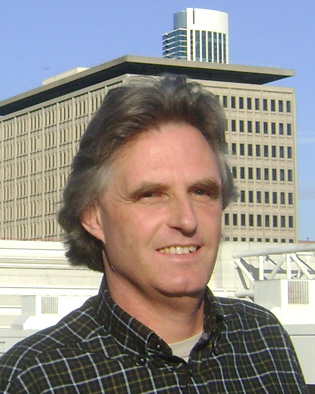
Metabolism is the set of life-sustaining chemical reactions in organisms. The three main functions of metabolism are: the conversion of the energy in food to energy available to run cellular processes; the conversion of food to building blocks of proteins, lipids, nucleic acids, and some carbohydrates; and the elimination of metabolic wastes. These enzyme-catalyzed reactions allow organisms to grow and reproduce, maintain their structures, and respond to their environments. The word metabolism can also refer to the sum of all chemical reactions that occur in living organisms, including digestion and the transportation of substances into and between different cells, in which case the above described set of reactions within the cells is called intermediary metabolism.

A heterotroph is an organism that cannot produce its own food, instead taking nutrition from other sources of organic carbon, mainly plant or animal matter. In the food chain, heterotrophs are primary, secondary and tertiary consumers, but not producers. Living organisms that are heterotrophic include all animals and fungi, some bacteria and protists, and many parasitic plants. The term heterotroph arose in microbiology in 1946 as part of a classification of microorganisms based on their type of nutrition. The term is now used in many fields, such as ecology, in describing the food chain.

The department of plant and microbial biology is an academic department in the Rausser College of Natural Resources at the University of California, Berkeley. The department conducts extensive research, provides undergraduate and graduate programs, and educates students in the fields of plant and microbial sciences with 43 department faculty members.

Werner Gitt is a German engineer and young earth creationist. Before retirement, he was Head of the Department of Information Technology at Physikalisch-Technische Bundesanstalt.

The Gottfried Wilhelm Leibniz Prize, or Leibniz Prize, is awarded by the German Research Foundation to "exceptional scientists and academics for their outstanding achievements in the field of research". Since 1986, up to ten prizes have been awarded annually to individuals or research groups working at a research institution in Germany or at a German research institution abroad. It is considered the most important research award in Germany.

Thomas Colin Campbell is an American biochemist who specializes in the effect of nutrition on long-term health. He is the Jacob Gould Schurman Professor Emeritus of Nutritional Biochemistry at Cornell University.

The Max Planck Institute for Terrestrial Microbiology is a research institute for terrestrial microbiology in Marburg, Germany. It was founded in 1991 by Rudolf K. Thauer and is one of 80 institutes in the Max Planck Society (Max-Planck-Gesellschaft). Its sister institute is the Max Planck Institute for Marine Microbiology, which was founded a year later in 1992 in Bremen.

The University of Veterinary and Animal Sciences, or UVAS originally known as Lahore Veterinary College, is a public university located in Lahore, Punjab, Pakistan.
The College of Biological Sciences (CBS) is one of seven freshman-admitting colleges at the University of Minnesota. Established in 1965, the College of Biological Sciences is located on both the Minneapolis and the St. Paul campuses. Faculty in the college conduct research on a wide range of topics that contribute to understanding of the environment, human health and basic biology. Dr. Saara J. DeWalt is the current dean of the college.

The College of Natural Science (NatSci) at Michigan State University is home to 27 departments and programs in the biological, physical and mathematical sciences.

Joachim Wilhelm "Jo" Messing was a German-American biologist who was a professor of molecular biology and the fourth director of the Waksman Institute of Microbiology at Rutgers University.

Professor J. S. Chiao, born Jui-Sheng Jiao, was a microbiologist from the Shanghai Institute of Plant Physiology and Ecology of the Chinese Academy of Sciences, and a member of the American Society for Microbiology. Professor Chiao spent 60 years in microbiology research, and was one of the world's leading scientists on its application to the field of biotechnology.

Faculty of Biology of the Belarusian State University was founded in 1931. It is a major biology research and teaching establishment in the country, which includes nine Departments and nine Research Laboratories. The Dean is Vadim Viktorovich Demidchyk, Docent, Doctor of Sciences

Ulrich Kutschera is a former German professor of biology who works as an academic advisor at I-Cultiver, Inc. in San Francisco and as a visiting scientist in Stanford/Palo Alto, California, US. He is the founder and head of "AK Evolutionbiologie", an association of evolutionary biologists in Germany. Starting in the 2000s, Kutschera started engaging with the public, first as a critic of creationism and intelligent design. Since the mid-2010s, his public statements and popular books focused on climate skepticism and criticism of gender studies.
The Plants for Human Health Institute (PHHI) is a North Carolina State University based research and education organization located at the North Carolina Research Campus in Kannapolis, North Carolina, United States. The PHHI researches food crops, like fruits and vegetables, and the potential health-promoting properties they may convey when consumed.

Otto Kandler was a German botanist and microbiologist. Until his retirement in 1986 he was professor of botany at the Ludwig Maximilian University of Munich.
Walter Julius Veith is a South African zoologist and a Seventh-day Adventist author and speaker known for his work in nutrition, creationism and Biblical exegesis.

The Geisenheim Yeast Breeding Center was founded in 1894 and is located in the town of Geisenheim, in Germany's Rheingau.

The TUM School of Life Sciences is a school of the Technical University of Munich, located at its Weihenstephan campus in Freising. It encompasses the life sciences, in particular biology, agricultural science, food technology, landscape architecture, biotechnology, and nutrition.















